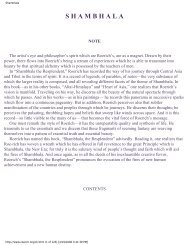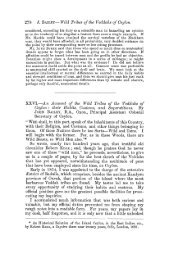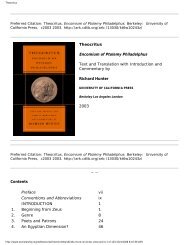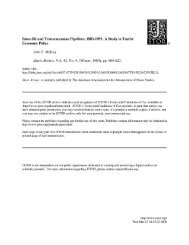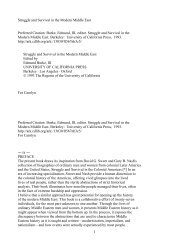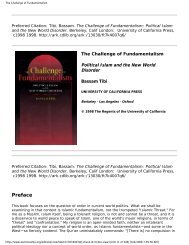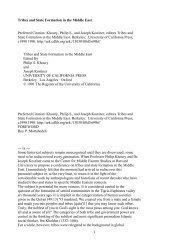Between Two Worlds Kafadar.pdf
Between Two Worlds Kafadar.pdf
Between Two Worlds Kafadar.pdf
Create successful ePaper yourself
Turn your PDF publications into a flip-book with our unique Google optimized e-Paper software.
engaging in Realpolitik.<br />
As depicted in a later episode, the drawbacks of rigidity could be all too<br />
apparent to the Muslim warriors through its consequences. According to this<br />
account, the people of the town of Sisiya converted to Islam, but they converted<br />
"out of the fear of the sword." The governor whom Danismend left in charge of<br />
the town "was extremely devout, a solid [or, rigid] religious scholar, and made<br />
the people of Sisiya pray all five times<br />
― 67 ―<br />
every day whether it was necessary or not. If one of them were not to come to<br />
the mosque [to pray with the congregation at the regular hours], he would be<br />
reprimanded. The hypocrites remained helpless."[16] When the town was besieged<br />
by the infidels, however, the governor paid dearly for this attitude. He<br />
gathered an army of the townsmen ten thousand strong, but "there were only about<br />
two thousand Muslims, while the other eight thousand were hypocrites." The<br />
latter switched sides during the confrontation, and all the Muslims, including<br />
the governor, were killed. On the one hand, this is a story of treachery that<br />
prepares the ground for the unfolding of the gazis' inevitable revenge; it could<br />
be read as a lesson on the dangers of putting too much trust in converts. On the<br />
other hand, it can also serve as a lesson on the hazards of too much orthodoxy.<br />
The narrator seems to have wanted his audience not to miss that reading by<br />
inserting the phrase underlined above: praying five times a day is of course<br />
incumbent upon all adult Muslims according to Sunni orthodoxy.<br />
The most important element of Melik Danismend's vita for our concerns here must<br />
be the hope of inclusion it offers to the Christians of Anatolia upon conversion<br />
to Islam. The same motif is central to the Battalname , where the best friend,<br />
the warrior companion, of Seyyid Battal Gaza happens to be his former foe on the<br />
Byzantine side.[17] And if the Battalname provides a matrix for the joint<br />
ventures of an Arab and a Greek warrior, the Danismendname goes further in that<br />
its warrior heroes come from different sides not only of religious and ethnic<br />
but also of gender boundaries. Melik Danismend is joined in the beginning of the<br />
narrative by Artuhi (an Armenian?) and Artuhi's beloved Efromiya (a Greek?), who<br />
recognize the military as well as religious and moral superiority of Melik<br />
Danismend and convert. The two are so quickly absorbed into the whirlwind of<br />
gaza that they do not even find time to change their names as they fight<br />
alongside the melik for the rest of his exploits. One of the most celebrated<br />
gaza narratives thus presents its audience with an eloquent surprise, namely,<br />
the seemingly incongruous image of a woman named Efromiya, even after she has<br />
become Muslim, leading raids on horseback or engaging in chivalric one-to-one<br />
combat in the name of Islam. In one of their first joint ventures, for instance,<br />
all three heroes take their ablutions, pray, and dine together, and Efromiya<br />
stands guard while the other two sleep. This does not prevent her, however, from<br />
being the first to ride into the field the next day and challenge the enemy, led<br />
by her own father, to send somebody for combat. That infidel "made three attacks<br />
but could not succeed. It was Efromiya's<br />
62




